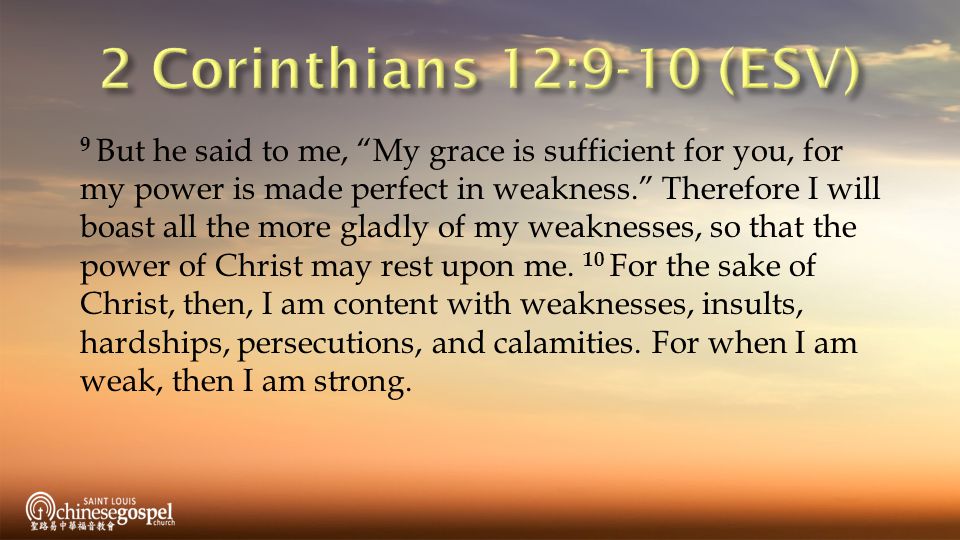Paul makes a beautiful statement that
"we have this treasure in earthen vessels,
so that the surpassing greatness of the
power will be of God and not from ourselves.”
The context helps us understand what is the treasure in earthen vessels (other translations say “jars of clay”). Paul is exhorting his readers that, even though there is great difficulty in their ministry, he is encouraged
(2 Corinthians 4:1).
He acknowledges that in his ministry he had received mercy and that he and the others who shared that ministry are not losing heart (in this case he is also referring to Timothy, see 2 Corinthians 1:1).
They could have confidence because they were
walking in the truth of God’s Word
and not in their own cleverness or craftiness
(2 Corinthians 4:2).
Because their confidence was in His truth
and not their own ability,
they could fulfill their ministry with
good conscience
even as God could observe their actions
(2 Corinthians 4:2).
Even though Paul and Timothy’s gospel-proclaiming ministry was at times met with rejection, it was not because of any flaw in the good news itself. Unbelievers suffer from a blindness of the mind and are unable to see the
“light of the gospel of the glory of Christ who is the image of God”
(2 Corinthians 4:3–4).
Because of this great need, the message of the gospel is so important. They weren’t proclaiming or promoting themselves; rather, they were serving others by proclaiming the message of Jesus Christ (2 Corinthians 4:5). The light that Paul and Timothy were proclaiming had come from God--that same God who had originally created light (Genesis 1:3) and who had determined that
Christ would come to provide light to humanity
(John 1:4–9).
God had accomplished the creation of light and the
coming of Jesus.
What He determines shall happen; it will indeed take place, and God had shone light in Paul’s and Timothy’s hearts that they would be equipped to present the wonderful truth of Jesus Christ and the eternal life He provides
(2 Corinthians 4:6).
It is for this reason that Paul explains that they
have the treasure in earthen vessels
(2 Corinthians 4:7)
and why that is significant.
Paul says elsewhere that, if he will boast,
he will boast in the Lord
(2 Corinthians 10:17).
He is doing exactly that here when he says that they have the treasure in earthen vessels (2 Corinthians 4:7). The marvel that Paul is communicating is that, even as Paul and Timothy (and presumably the other disciples) were proclaiming Christ, they were not fulfilling this responsibility in their own power. Instead, God had provided the life, the power, and the message. Paul understood that those who were doing the actual proclaiming were simply earthen vessels—with no glory or merit of their own. As he said to the Corinthians in his previous letter, “Neither the one who plants nor the one who waters is anything, but God who causes the growth” (1 Corinthians 3:7). Such lowly and humble people were given an incredible treasure—the personal and lifegiving knowledge of Jesus Christ in their own lives and the good news to proclaim to others. This shows how surpassing is the strength and power of God, and those who hear the message can be encouraged that the power is from God and His truth. The power does not originate in the cleverness or strength of people.
As God uses broken and imperfect people, we can also be encouraged that God can use us to accomplish important things and that, when we use the tools He provides, the power is not our own, but His.
We are simply earthen vessels / jars of clay; the treasure is
God’s gift inside.
In 2 Corinthians, the apostle Paul defends his ministry from those who would attack him and the gospel he proclaims. Chapter 4 is a key part of Paul’s argument, as he acknowledges the many weaknesses his detractors have highlighted, both physical and mental (2 Corinthians 10:10). However, rather than promote his own strength, Paul points to God’s power, which sustains him through every crisis (2 Corinthians 4:7). In verses 8–9, he lists a series of four problems but contrasts them with God’s protection and provision. Verse 8 contains one of these interesting antitheses, as Paul states that the apostles are “perplexed, but not in despair” (2 Corinthians 4:8).
According to A Greek-English Lexicon of the New Testament and Other Early Christian Literature, the word for “perplexed” in the original language simply means to be “confused,” “uncertain,” or “in doubt.” A great example of this word is found in Galatians 4:20, where Paul is experiencing “pastoral perplexity” over the Galatians’ inconsistent behavior. One minute, they were excited about the gospel, and the next they were following false teachers (Galatians 4:14–17)! Like many pastors throughout history, Paul experienced doubts and uncertainty about his ministry, his personal strength, and the churches he left behind during his travels (2 Corinthians 11:28–29). These are the doubts he expresses when he describes himself as “perplexed, but not in despair” (2 Corinthians 4:8).
The word translated “despair” reveals a fascinating wordplay: in the original language, it is the same word translated “perplexed,” except with the prefix ex- added. Just like the word extra in English, the prefix ex- in this case emphasizes the original word to its fullest extent. The idea is “beyond perplexed” or “totally perplexed.” Paul is saying that he has experienced doubt and confusion, but not to the point of despair or breaking. He has been confused, but not confounded; doubting, but not despairing; lost, but never losing everything. The main idea is that Paul has experienced confusion and doubt, but God has never allowed that perplexity to overwhelm him.
What about us? Like Paul, we often experience confusion and doubt. We may wonder why God allows something bad to happen to us or whether someone we care about is going to succeed in the Christian faith. These feelings of uncertainty are normal. Like Paul, we can take comfort in the fact that God remains in control of every situation in our lives. We can be “perplexed, but not in despair,” because we “fix our eyes not on what is seen, but on what is unseen, since what is seen is temporary, but what is unseen is eternal” (2 Corinthians 4:18).
Paul defends his apostleship for the sake of the Corinthians so they can be encouraged and built up in the certainty of the gospel (2 Corinthians 12:19). In his letter Paul recounts some of the difficulties and persecutions he and other apostles were facing. In this context he notes that they were “persecuted, but not forsaken” (2 Corinthians 4:9, ESV).
Paul was thankful to be proclaiming a message of grace and freedom rather than law and bondage (2 Corinthians 3), and, because of the importance of that ministry, he and the other apostles would not lose heart.
Rather, they would be bold in their
proclamation of the truth
(2 Corinthians 4:1–2).
They had clear consciences as they fulfilled the ministry of proclaiming that truth to everyone, even though there were many who were blinded and would not accept that message
(2 Corinthians 4:3–4).
They were not proclaiming this message in their own power or by their own wisdom; they were proclaiming Jesus Christ (2 Corinthians 4:5–6). They readily recognized their own weakness and limitation—they were merely earthen vessels for a heavenly message of grace (2 Corinthians 4:7)—and the power of the message was not of themselves. Consequently, the Corinthians could have confidence in the apostles’ message because it was true and originated from God.
The apostles were not the source of the power; they were simply ministers of it.
Paul underscores their own limitations and weakness when he explains that they are afflicted in every way, but not crushed (2 Corinthians 4:8a)—they had hardship, but that hardship could not defeat them because they were standing in the truth. They were perplexed, but not in despair. They struggled with perhaps even a degree of anxiety but would not fall into depression because of the certainty of their hope (2 Corinthians 4:8b).
They were persecuted but not forsaken (2 Corinthians 4:9a)—though many had rejected their message and even did so violently at times, Paul knew they were not alone. God had not left them, no matter how severe the rejection by some. They had even been literally struck down, but they were not destroyed (2 Corinthians 4:9b). No matter the difficulty they faced, the apostles recognized it was nothing as severe as Christ had encountered, and they were simply fulfilling what He had commissioned them to do (2 Corinthians 4:10–11). Even in their weakness and the difficulties they faced, they kept in mind the reason for their ministry: that people could receive Christ by faith and have life (2 Corinthians 4:12).
Everything Paul and the other apostles faced, they did so for the sake of those who would receive their message (2 Corinthians 4:15). So, even in difficult and painful situations, they would not lose heart (2 Corinthians 4:16). They were not focused on the temporal difficulties; instead, they set their minds on the eternal value of the ministry God had given them (2 Corinthians 4:16–18).
In some ways, we also may face persecution and difficulty, but, if we are suffering for that which has eternal value, then we are not forsaken. God never deserts or forsakes those who are His (John 10:27–31; Hebrews 13:5).
We can focus on Him—like the apostles did—and not lose heart (see Hebrews 12:1–3).
What does 2 Corinthians 2:4 mean? Paul visited the Corinthians briefly following the writing of 1 Corinthians. During that painful visit, a confrontation took place. This appears to have been with a church member challenging Paul's authority as an apostle. It is unclear if most in the church sided with Paul or with this other man. Paul wrote the now-lost letter to them in order to urge the church to deal with this man and make clear their support for Paul's authority as an apostle of Jesus.
Writing that letter, Paul now says, caused him great pain. He wrote it out of affliction and anguish of heart, shedding tears as he sent it. He did not write it in order to cause them pain. That's the last thing Paul wanted for them. Instead, he wrote it because he loved them so deeply. He knew that hearing the truth might hurt them, but he also hoped it would bring healing to everyone involved. Apparently, that's exactly what has happened.
Many of the principles of God’s kingdom
are paradoxes.
When Paul pleaded with God to remove his affliction—one he called a “thorn in the flesh”—the Lord said to Paul, “My grace is sufficient for you, for My strength is made perfect in weakness” (2 Corinthians 12:8–9, NKJV). The New Living Translation says, “My grace is all you need. My power works best in weakness.” God’s strength is made perfect in weakness because He delights in taking situations where human strength is lacking to demonstrate the greatness of His power.
God’s denial of Paul’s request for healing turned out to be a blessing in the apostle’s life.
One commentary explains that the thorn “kept Paul from imagining himself as a spiritual superman, and revealed to him the reality of his human mortality and weakness despite his extraordinary revelations. The ‘thorn’ also kept Paul pinned close to the Lord, in trust and confidence”
Paul stopped protesting his situation and began to boast and even take pleasure in his weakness so that the power of Christ could work through him: “That is why, for Christ’s sake, I delight in weaknesses, in insults, in hardships, in persecutions, in difficulties. For when I am weak, then I am strong” (2 Corinthians 12:10). Paul expressed the paradox of his condition—that in his frailty, he was strong because his strength came from Christ.
The words made perfect in 2 Corinthians 12:9 mean
“fully or entirely accomplished or made complete.”
Christ’s power is made complete—it is able to fully accomplish its purpose—when His people are weak and depend on Him for strength.
When we, like Paul, stop resisting and complaining and let the power of Christ rest on us, we make room to receive countless unexpected blessings from the Lord. By allowing God’s strength to be made perfect in our weakness, we have the opportunity to display God’s glory flawlessly. “The grace and power of God interlock with human lives at the point of human weakness,”
Over and over, the Bible gives examples of God’s strength manifesting when His people are weak. Moses, the great leader of Israel, was deeply aware of his human shortcomings (Exodus 4:10). When the Lord called him to go to Pharaoh, Moses cried, “I’m not adequate. Please send someone else!” But God replied, “Go anyway, Moses, because I will be with you” (see Exodus 4:12–15).
Gideon’s story proves that God can accomplish great things through people who forget about their human weaknesses, trust in God’s strength, and obey His guidance (Judges 6:14–16). And, of course, our most notable biblical example, Jesus Christ, was “crucified in weakness” but “now lives by the power of God” (2 Corinthians 13:4, NLT).
First Corinthians 1:27 teaches, “But God chose the foolish things of the world to shame the wise; God chose the weak things of the world to shame the strong.” We must never shrink away from God because of our weakness but run to Him, letting Him equip and empower us to accomplish His will. We must remember His promise: “He gives strength to the weary and increases the power of the weak. Even youths grow tired and weary, and young men stumble and fall; but those who hope in the LORD will renew their strength. They will soar on wings like eagles; they will run and not grow weary, they will walk and not be faint” (Isaiah 40:29–31).
When we are in a position of need, it allows us to see how much we need God
(2 Corinthians 1:9; 3:5; 13:4).
The more aware we are of our weakness, the more God can reveal His power through us: “We now have this light shining in our hearts, but we ourselves are like fragile clay jars containing this great treasure. This makes it clear that our great power is from God, not from ourselves” (2 Corinthians 4:7, NLT).
God’s strength is made perfect in weakness when we put our faith and trust in Him. The Lord’s presence is all we need in times of weakness. His great power and sufficiency rest on us as we find our strength in Him, and He is glorified. We can say with the psalmist, “My flesh and my heart may fail, but God is the strength of my heart and my portion forever” (Psalm 73:26).




 RSS Feed
RSS Feed
























































